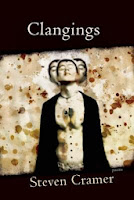Clangings
Steven Cramer
Sarabande Books
Perfect bound, 65 pgs
ISBN 978-I-936747-46-7
www.sarabandebooks.org
Reviewed by Lisa C. Krueger
Language, it could be argued, is the conduit to reality. Without this form of communication – to others, to ourselves- what might prove that we exist? Helen Keller famously declared her inner life transformed from chaos to clarity when she first connected a word (water) to physical sensation. For most poets, the distillation and condensation of language serves to magnify human experience. Steven Cramer, in his fifth collection of poems, employs an innovative strategy, opening himself to the space outside of language by pushing up against its limitations. Clangings is a restless, ambitious enterprise.
The forty-nine untitled poems of this book comprise disassociated, manic musings of a man we could call insane, crazy, schizophrenic, or bipolar. Cramer has captured the bravado and patois of a mentally ill person whose thoughts veer from place to place like a drunken bee seeking nectar. Those of us familiar with psychiatric disorders recognize the “clang” phenomenon, whereby a person demonstrates a seemingly uncanny ability to link word sounds and concepts. These links, while nonsensical, nevertheless startle the imagination: “Me: playing skins in the infield./Shins shining. Shit undefiled” or “Dad. He plays dead, and his leash/depreciates its lash. What’s he after/in the afterlife? The more I dog-ear/the moors, more I sniff his ash. Hellish.” What vivid yet disturbing fun these poems offer through a state of imagist disequilibrium.
Sound and sense intermingle so fiercely in the poems that dislocation often prevails over meaning. Lines ambulate from past to present, from third person to first as though boundaries have no purpose. Indeed, musicality is king:“The Pullman pulls still. Glass cracks/a temple-level, spider-web of splits.” Alliteration, slant rhymes and vigorous metrics pervade the quatrains of this book, reminding us that this is not nonsense we experience but poetry.
There is a method to this madness. Clangings is a labyrinth of loss and redemption. The speaker addresses the dominance of his parents, the love of his brother Dickey, and the loss of this brother in tender, poignant lyrics. His manic meditations offer unexpected room within the rush of language, as though words may provide sanctuary. Of his brother, he writes:
Dickey’s death feels all over me….
I’ve lost my spirit, my shot at distemper,
Nobody’s rabies can pillow this blow.
Nobody’s but Dickey’s.
For this “mad” speaker whose expressions veer in every direction, the experience of grief is centered and whole. Dickey’s death is felt at the core: “A finch in my chest flinches to get/heard. Wingman sewed it in….Mind you, it takes brains to slice/open a hide…slide in a gift like his….”
Cramer’s poems progress through grief to a kind of manic closure, suggesting that even the most unstable of us can find our way through deep pain. In one of the late poems the speaker reprimands his psychiatrist: “…so hands off my lobes, Dr.Will/Bill ignoble. You don’t have a clue…You rave to me about manias/as if D’s still here. Miss him…/miss him miss him miss him.”
In the madness is method. Immersion in the loose, musical associations and musings of this book renders a lightness, a sense that one could emerge from life’s craziness intact, even whole. Other poets – Paul Muldoon, Michael Robbins – have flourished in the musical miasma of loose association. Passages from Joyce’s Ulysses bear likeness to passages of Clangings. Like Ulysses, Clangings is more than wordplay and clever riffs. In the last poem, the speaker says to his brother, “Well now, you and I are words apart.” Language separates us, language connects us – our demise, our opportunity. Cramer’s book brings us full circle to self – who am I without language? Clangings reverberates.
Lisa C. Krueger is a poet and clinical psychologist in Pasadena. Her poems have been published or are about to be published in various journals such as Prairie Schooner, Atlanta Review, and Rattle. Her third book of poetry, Talisman, will be published by Red Hen Press in 2014.

